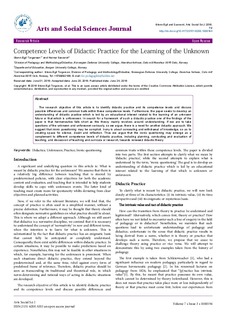| dc.description.abstract | The research objective of this article is to identify didactic practice and its competence levels and discuss possible differences and common traits within these competence levels. Furthermore, the paper seeks to develop an understanding of didactic practice which is led by an educational interest related to the learning of an unknown future or that which is unforeseen. In search for a framework of such a didactic practice one of the findings of the paper is that hermeneutics falls short as this theory mainly revolves around understanding. If we are to take questions of the unknown and unforeseen seriously, so we argue, there is a need for another didactic approach. We suggest that ironic questioning may be complicit. Irony is about concealing and withdrawal of knowledge, so as to creating space for silence, doubt and reflection. Thus we argue that the ironic questioning may emerge as a complement to different competence levels of didactic practice, including planning, conducting and evaluation of teaching, and discussion of teaching and curricula or research, towards renewed didactic theory. | |
